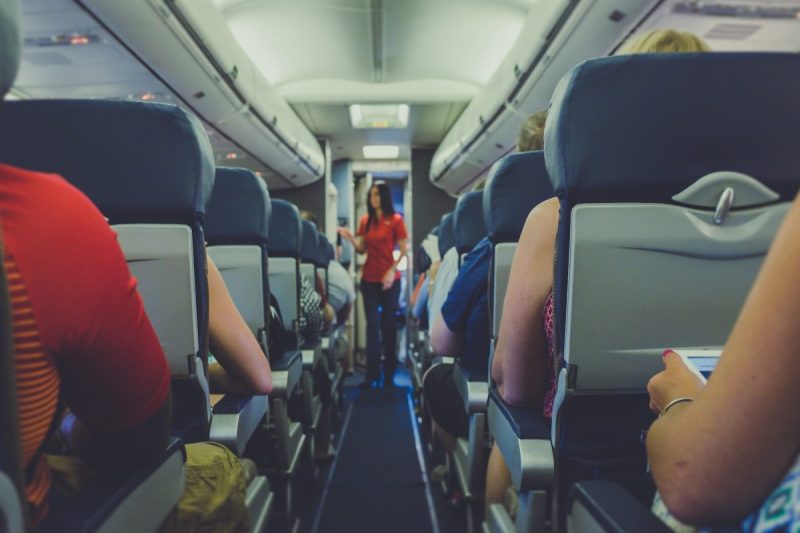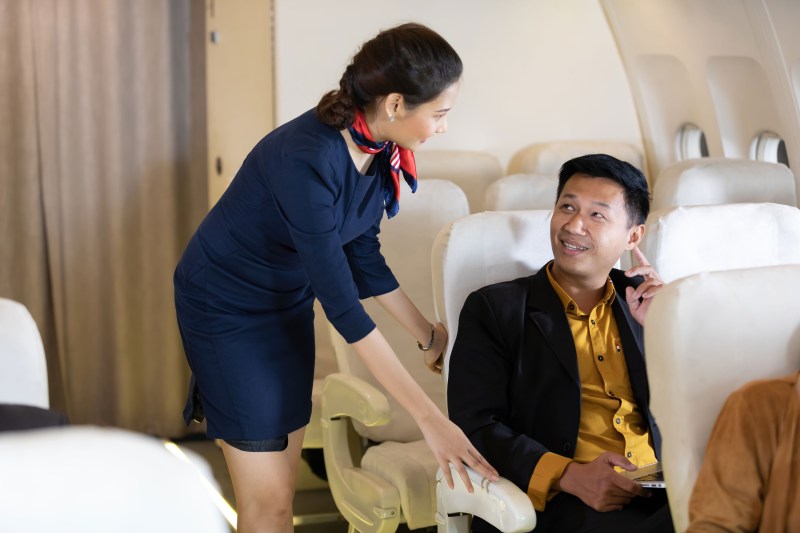If you’ve ever glanced at a flight attendant during takeoff or landing, you might have noticed something peculiar: they often sit on their hands. This isn’t just a funny habit; it’s a safety protocol. Flight attendants sit on their hands during these critical phases of flight to protect themselves.
Hilary Clark, director of in-flight services with private jet company Planet 9, told Travel + Leisure, “It’s a safety position. The reason for this safety position is if an emergency were to occur in takeoff or landing, their head, hands, and arms are already in a slight brace position.”
This position allows flight attendants to maintain proper posture and brace more effectively against the seat. Additionally, it minimizes the risk of injury as the body is more restricted. Flight attendants are trained to be extra aware during the takeoff and landing phases of flights, and assuming this position ensures that they are in the best possible condition to assist passengers if needed.
Is this position necessary for passengers?

While flight attendants sitting on their hands is a specific protocol for crew safety and readiness, passengers are not required to adopt this position. However, there are recommended positions for passengers to enhance their safety during takeoff and landing. Brace positions for passengers often require you to hug your knees or push your arms against the seat in front of you. Passengers should also keep their seat belts fastened and remain seated to ensure that they are secure during these bumpier phases of the flight.
Before taking off, it is important to read the safety instructions for the specific aircraft you are on. It is also a good idea to pay attention to the safety video or demonstration the flight attendants give before takeoff. Taking these steps allows you to be more prepared in an emergency.
Why do they make you open the window shade at takeoff and landing

Another thing that you might notice about flight attendants during takeoffs and landings is that they make sure that every window shade on the plane is open. This isn’t because they want to admire the view, once again, like sitting on their hands, it’s all about safety.
The first reason has to do with you, the passenger. Opening the window shades helps get your eyes used to the conditions outside, whether it’s dark or light; this is also why the pilot dims the cabin lights during takeoff and landing. If your eyes are used to the light conditions outside the plane, you will be able to react more quickly in the case of an emergency.
The other reason for keeping the shades up is to allow the flight attendants to be able to see outside (no, they aren’t looking for strange creatures on the wing). This allows them to see if there is anything wrong with the engines if the plane needs to be evacuated, and which side of the plane is the safest to evacuate from. Also, emergency crews on the ground can easily see if there is any smoke or fire inside the plane if the shades are up.
Flight attendants are always looking out for your safety

Flight attendants are trained professionals whose primary responsibility is the safety of passengers. Their role extends far beyond serving drinks and snacks. Before passengers board the plane, flight attendants conduct thorough safety checks, ensuring that emergency equipment like life vests, oxygen masks, and fire extinguishers are all in working order.
Before every takeoff and landing, flight attendants also perform a “silent review.” This silent review is mentioned in Airbus’s safety documents, stating, “The silent review is recommended for cabin crew to mentally recall the key aspects of the emergency evacuation procedure while they are seated at their station before each takeoff and landing. This silent review will help the cabin crew to focus and be prepared in case an emergency evacuation is required.”
Flight attendants also undergo regular training to keep their skills sharp and stay updated on the latest safety procedures. So, next time you fly, take a moment to appreciate the meticulous care and attention flight attendants devote to keeping everyone safe and secure.




